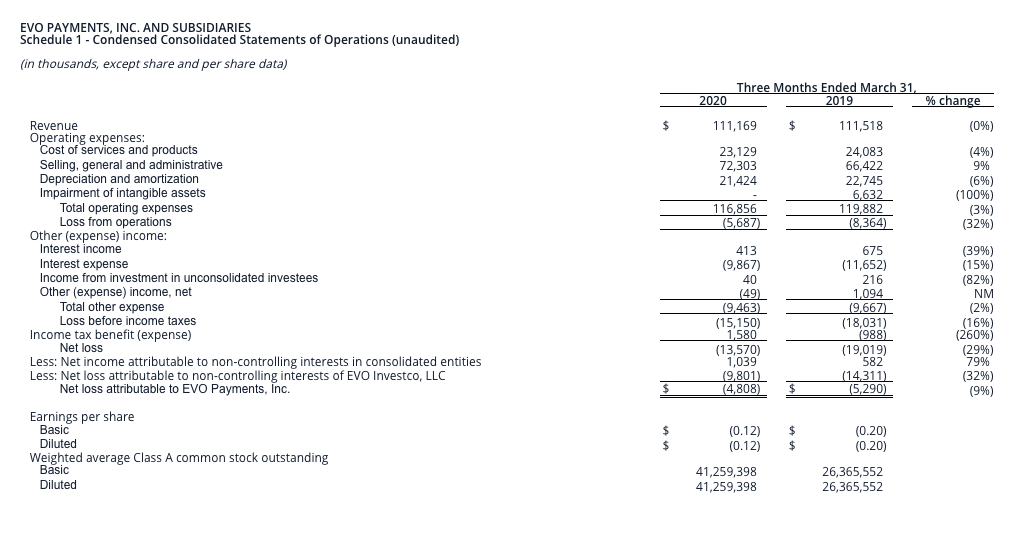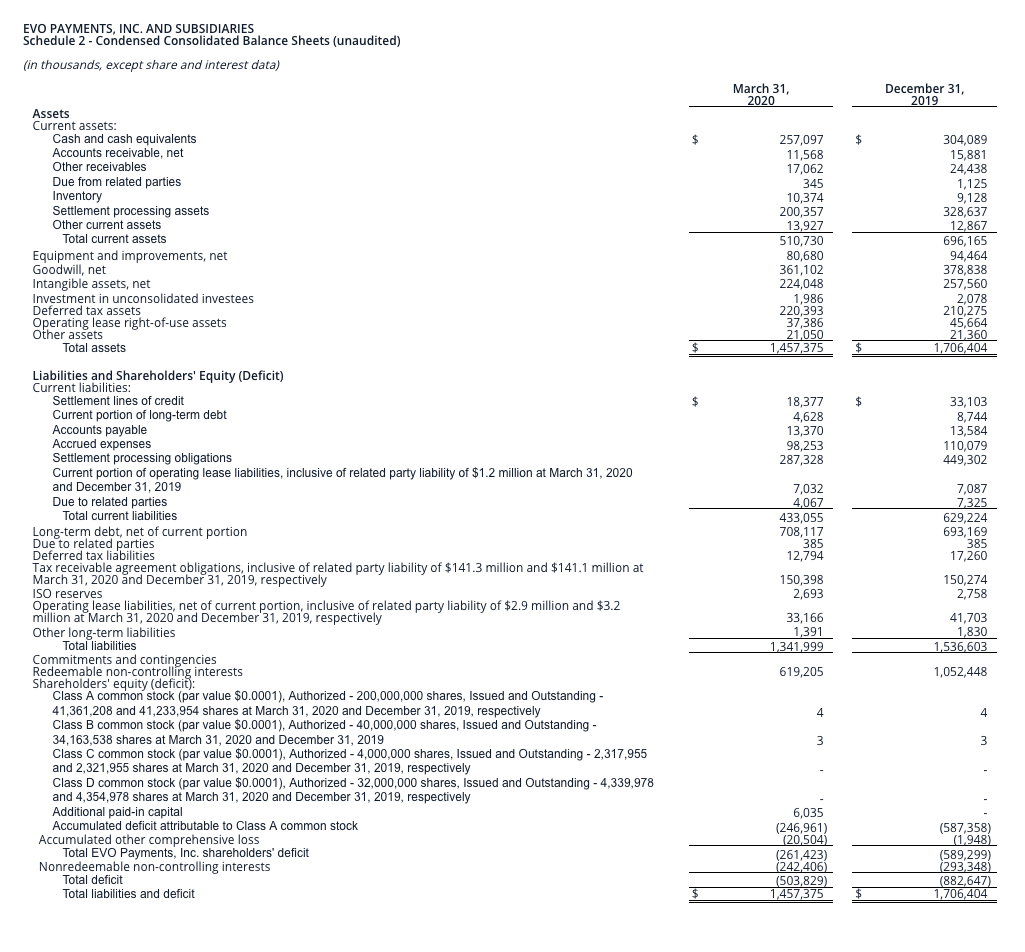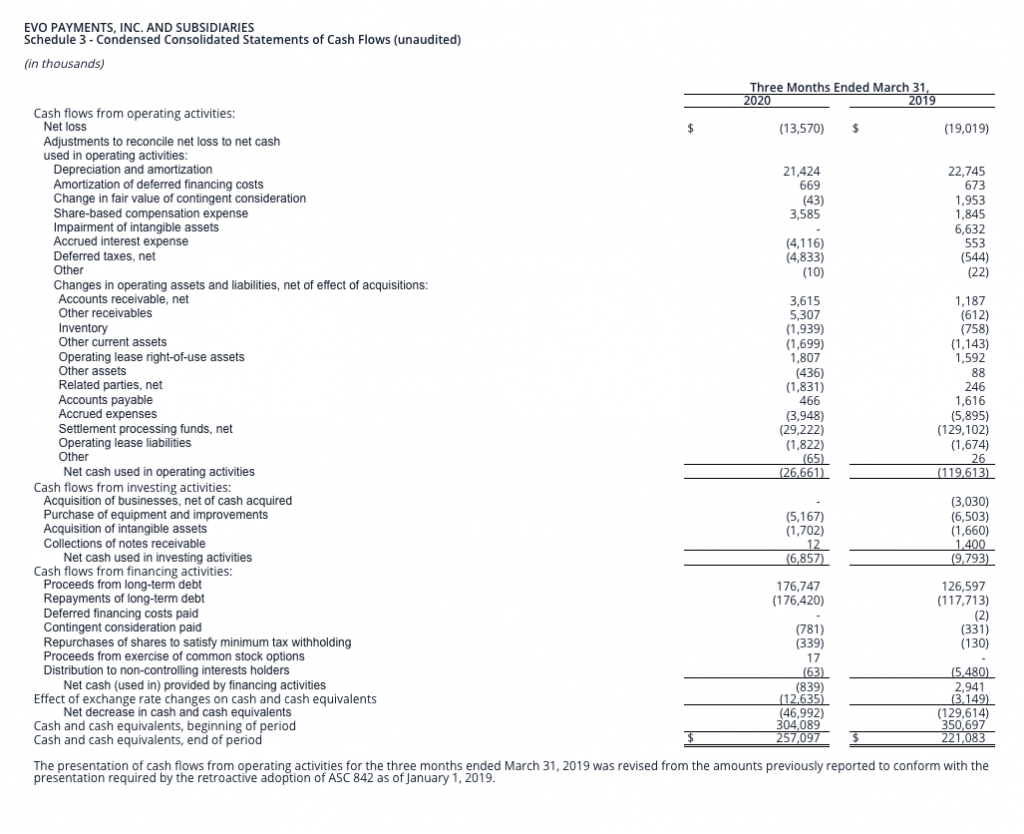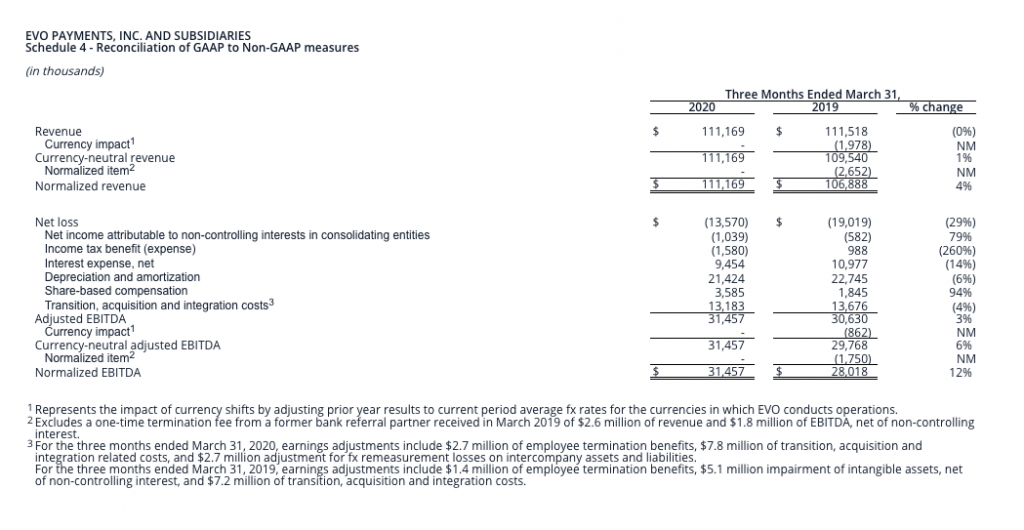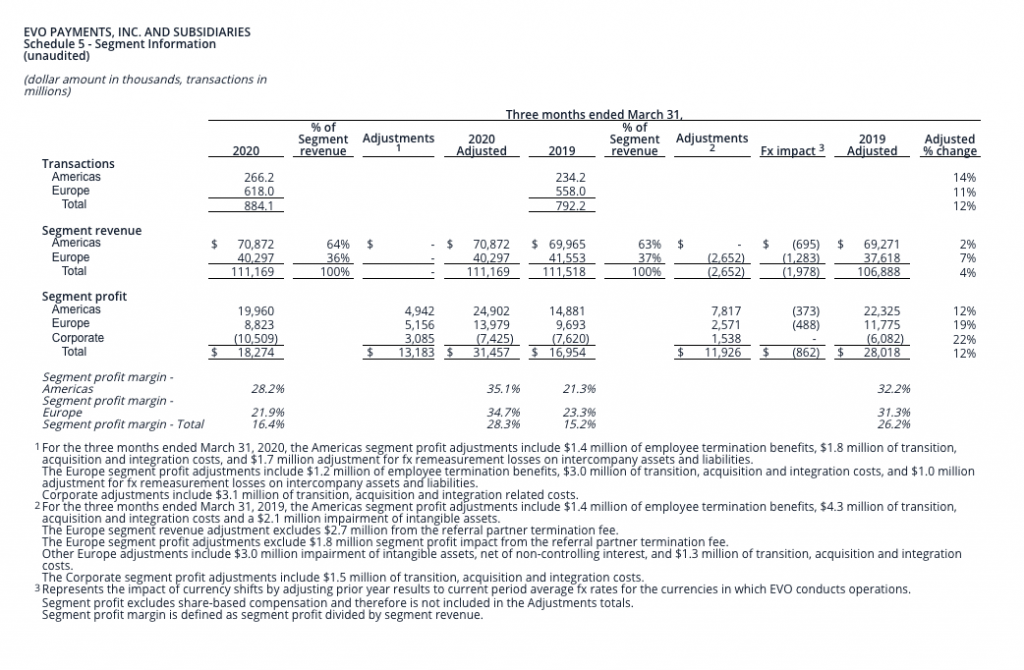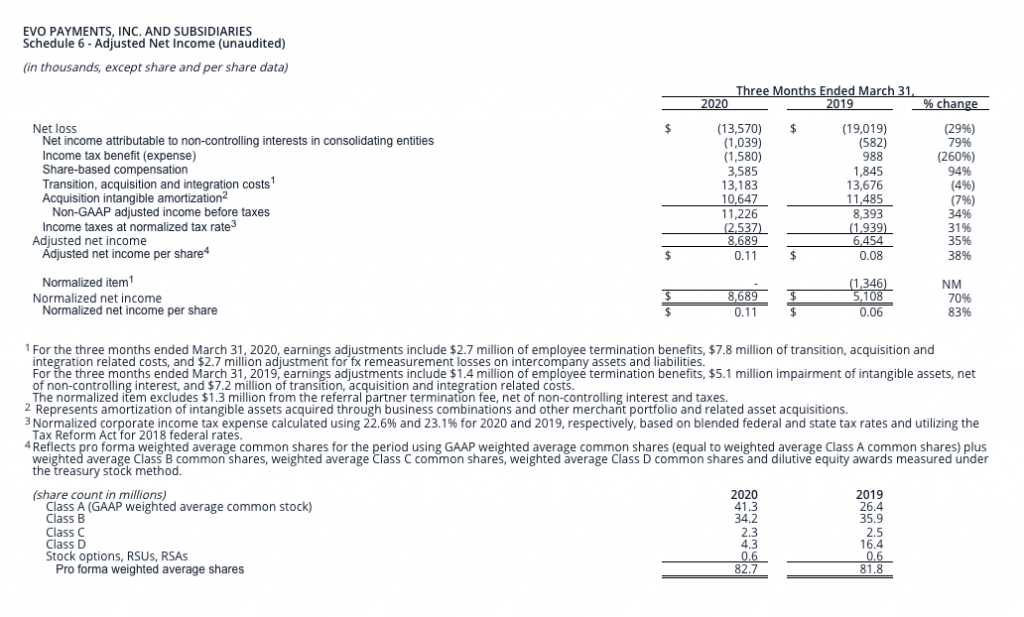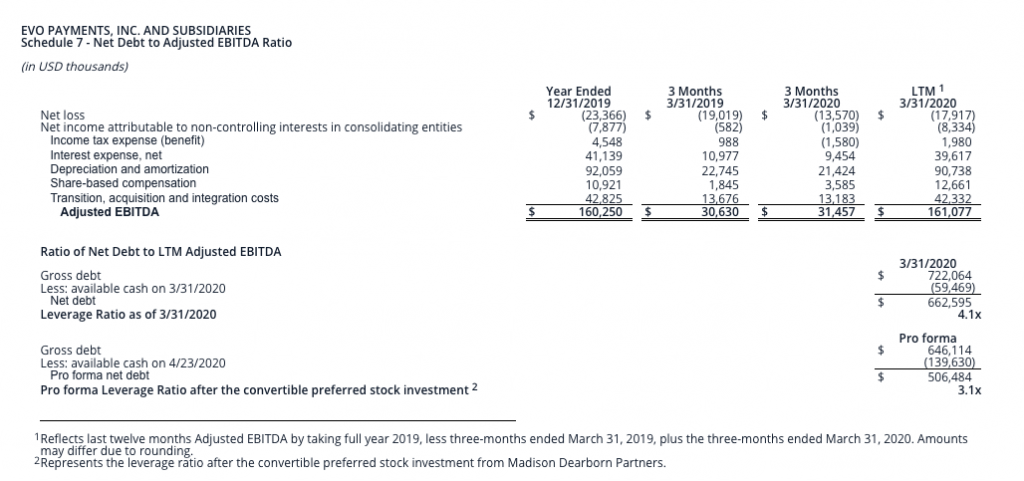
ATLANTA, May 08, 2020 (GLOBE NEWSWIRE) — EVO Payments, Inc. (NASDAQ: EVOP) (“EVO” or the “Company”) today announced its first quarter 2020 financial results. For the first quarter ended March 31, 2020, reported revenue of $111.2 million was flat compared to $111.5 million in the prior year. On a currency neutral basis, reported revenue for the first quarter increased 1.5%. On a GAAP basis for the quarter ended March 31, 2020, the Company recognized a net loss of $13.6 million, an improvement of 29% compared to the prior year. Adjusted EBITDA increased 3% to $31.5 million for the quarter, and on a currency neutral basis, adjusted EBITDA grew 6% over the prior year.
“While the last month of the quarter was adversely impacted by COVID-19, the full effect of the economic disruption from the virus will manifest in the second quarter. Our geographic, channel, and merchant diversification, and the actions we took to strengthen our balance sheet and reduce our fixed costs will enable us to withstand a significant decline in economic activity and positions us well to resume our growth plans as the global economies recover,” said James G. Kelly, Chief Executive Officer of EVO. “I am extremely proud of how our employees have responded to this crisis. Their tireless dedication, professionalism, and commitment to serving our customers during this challenging time has been commendable.”
Due to the uncertainty surrounding the pace of the global recovery, the Company secured a $150 million investment from funds affiliated with Madison Dearborn Partners, LLC, a leading private equity firm that has been a significant shareholder of the Company since 2012, in April 2020 and recently amended its revolving credit facility to increase the maximum leverage ratio through March 31, 2021 to 6.0 times the last twelve months adjusted EBITDA. Together, these actions provide the Company with additional financial flexibility to both withstand and emerge from the global pandemic.
Conference Call
EVO’s management will host a conference call for investors at 8:00 a.m. Eastern Time on Friday, May 8, 2020 to discuss the results. Participants may access the conference call via the investor relations section of the Company’s website at www.evopayments.com, or participants may also dial (866) 209-9657 inside the U.S. and Canada and (825) 312-2290 outside the U.S. and Canada to listen. The conference ID number is 6855008. A recording of the call will be archived on the Company’s investor relations website following the live call.
Supplementary Charts
To assist in understanding the impact COVID-19 is having on our business, the Company has posted a summary of its recent payment volume trends on its Investor Relations website at https://investor.evopayments.com/1Q20paymentvolume.
Forward-Looking Statements
This release and the accompanying earnings conference call contain statements about future events and expectations that constitute forward-looking statements. Forward-looking statements are often identified by words such as “anticipates,” “believes,” “continues,” “estimates,” “expects,” “goal,” “objectives,” “intends,” “may,” “opportunity,” “plans,” “potential,” “near-term,” “long-term,” “projections,” “assumptions,” “projects,” “guidance,” “forecasts,” “outlook,” “target,” “trends,” “should,” “could,” “would,” “will” and similar expressions. We intend such forward-looking statements to be covered by the safe harbor provisions for forward-looking statements contained in Section 27A of the Securities Act of 1933 and Section 21E of the Securities Exchange Act of 1934. Forward-looking statements are based on our current beliefs, assumptions, estimates, and expectations, taking into account the information currently available to us, and are not guarantees of future results or performance. Forward-looking statements are not statements of historical fact. Forward-looking statements involve risks and uncertainties that may cause our actual results to differ materially from the expectations of future results we express or imply in any forward-looking statements, and you should not place undue reliance on such statements. Factors that could contribute to these differences include the following: (1) the impact of the COVID-19 crisis on our business and our merchants, including the impact of social distancing, shelter-in-place, shutdowns of non-essential businesses and similar measures imposed or undertaken by governments; (2) our ability to anticipate and respond to changing industry trends and the needs and preferences of our customers and consumers; (3) the impact of substantial and increasingly intense competition; (4) the impact of changes in the competitive landscape, including disintermediation from other participants in the payments chain; (5) the effects of global economic, political, market, health and other conditions, including the impact of the COVID-19 virus; (6) our compliance with governmental regulations and other legal obligations, particularly related to privacy, data protection, information security, and consumer protection laws; (7) our ability to protect our systems and data from continually evolving cybersecurity risks or other technological risks; (8) failures in our processing systems, software defects, computer viruses, and development delays; (9) degradation of the quality of the products and services we offer, including support services; (10) risks associated with our ability to successfully complete, integrate and realize the expected benefits of acquisitions; (11) continued consolidation in the banking and payment services industries, including the impact of the combination of Banco Popular and Grupo Santander and the related bank branch consolidation; (12) increased customer, referral partner, or sales partner attrition; (13) the incurrence of chargebacks; (14) failure to maintain or collect reimbursements; (15) fraud by merchants or others; (16) the failure of our third-party vendors to fulfill their obligations; (17) failure to maintain merchant and sales relationships or financial institution alliances; (18) ineffective risk management policies and procedures; (19) our inability to retain smaller-sized merchants and the impact of economic fluctuations on such merchants, (20) damage to our reputation, or the reputation of our partners; (21) seasonality and volatility; (22) our inability to recruit, retain and develop qualified personnel; (23) geopolitical and other risks associated with our operations outside of the United States; (24) any decline in the use of cards as a payment mechanism or other adverse developments with respect to the card industry in general; (25) increases in card network fees; (26) failure to comply with card networks requirements; (27) a requirement to purchase our eService subsidiary in Poland; (28) changes in foreign currency exchange rates; (29) future impairment charges; (30) risks relating to our indebtedness, including our ability to raise additional capital to fund our operations on economized terms or at all and exposure to interest rate risks; (31) changes to, or the potential phasing out of, LIBOR and the transition to other benchmarks; (32) restrictions imposed by our credit facilities and outstanding indebtedness; (33) participation in accelerated funding programs; (34) failure to enforce and protect our intellectual property rights; (35) failure to comply with, or changes in, laws, regulations and enforcement activities, including those relating to corruption, anti-money laundering, data privacy, and financial institutions; (36) impact of new or revised tax regulations; (37) legal proceedings; (38) our dependence on distributions from EVO Investco LLC to pay our taxes and expenses, including certain payments to the Continuing LLC Owners (as defined in our public filings) and, in the event that any tax benefits are disallowed, our inability to be reimbursed for payments made to the Continuing LLC Owners; (39) our organizational structure, including benefits available to the Continuing LLC Owners that are not available to holders of our Class A common stock to the same extent; (40) the risk that we could be deemed an investment company under the Investment Company Act of 1940, as amended; (41) the significant influence the Continuing LLC Owners continue to have over us, including control over decisions that require the approval of stockholders; (42) certain provisions of Delaware law and antitakeover provisions in our organizational documents could delay or prevent a change of control; (43) certain provisions in our organizational documents, including those that provide Delaware as the exclusive forum for litigation matters and that renounce the doctrine of corporate opportunity; (44) our ability to establish and maintain effective internal control over financial reporting and disclosure controls and procedures; (45) changes in our stock price, including relating to downgrades, analyst reports, and future sales by us or by existing stockholders; and (46) the other risks and uncertainties included from time to time in our filings with the SEC, including those listed under “Risk Factors” contained in Part I of our Annual Report on Form 10-K for the year ended December 31, 2019.
We qualify any forward-looking statements entirely by the cautionary factors listed above, among others. Other risks, uncertainties and factors, not listed above, could also cause our actual results to differ materially from those projected in any forward-looking statements we make. We assume no obligation to update or revise these forward-looking statements for any reason, or to update the reasons actual results could differ materially from those anticipated in these forward-looking statements, even if new information becomes available in the future.
Non-GAAP financial measures
EVO Payments, Inc. has supplemented revenue, segment profit, net income (loss), earnings per share information and weighted average common shares determined in accordance with GAAP by providing these and other measures on an adjusted basis in this release. The non-GAAP financial measures presented herein should not be considered in isolation of, as a substitute for, or superior to, financial information prepared in accordance with GAAP, and such measures may not be comparable to those reported by other companies. Management uses these adjusted financial performance measures for financial and operational decision making and as a means to facilitate period-to-period comparisons. Management also uses these non-GAAP financial measures, together with other metrics, to set goals for and measure the performance of the business and to determine incentive compensation. The Company believes that these adjusted measures provide useful information to investors about the Company’s ongoing underlying operating performance and enhance the overall understanding of financial performance of the Company’s core business by presenting the Company’s results without giving effect to equity-based compensation and costs related to transition, acquisition and integration matters, and giving effect to a normalized effective tax rate for the Company. This release also contains information on various financial measures presented on a currency-neutral basis. The Company believes these currency-neutral measures provide useful information to investors about the Company’s performance by excluding fluctuations caused solely by movements in currency exchange rates in the non-U.S. jurisdictions where the Company operates. Reconciliations of each non-GAAP measure to the most directly comparable GAAP measure are included in the schedules to this release.
Among other non-GAAP financial measures presented, this release contains a presentation of our adjusted EBITDA and adjusted net income. Neither of these measures purport to be an alternative to cash flows from operating activities as a measure of liquidity, and neither is intended to be a measure of free cash flow available for management’s discretionary use as they do not consider certain cash requirements such as tax payments and, in the case of adjusted EBITDA, interest payments and debt service requirements. Further, adjusted EBITDA does not purport to be an alternative to net income as a measure of operating performance. These measures, or measures similar to them, are also frequently used by analysts, investors and other interested parties to evaluate companies in the industry. Adjusted EBITDA is defined as net income (loss) before provision for income taxes, net interest expense, and depreciation and amortization, excluding the impact of net income attributable to non-controlling interests in consolidated entities (including related depreciation and amortization), share-based compensation, and transition, acquisition and integration costs. Adjusted net income is defined as net income (loss) adjusted to exclude income taxes, the impact of net income attributable to non-controlling interests in consolidated entities (including related depreciation and amortization), share-based compensation, transition, acquisition and integration costs, and amortization of acquisition intangibles and subsequently adjusted to give effect to a normalized tax rate for the Company. The calculation of adjusted EBITDA and adjusted net income have limitations as analytical tools, including: (a) they do not reflect the Company’s cash expenditures, or future requirements for capital expenditures or contractual commitments; (b) they do not reflect changes in, or cash requirements for, the Company’s working capital needs; (c) in the case of adjusted EBITDA, it does not reflect the interest expense or the cash requirements necessary to service interest or principal payments on the Company’s indebtedness; (d) they do not reflect the Company’s tax expense or the cash requirements to pay the Company’s taxes; and (e) although depreciation and amortization are non-cash charges, the assets being depreciated and amortized will often have to be replaced in the future and these measures do not reflect any cash requirements for such replacements. Adjusted net income per share is defined as adjusted net income divided by pro forma weighted average common shares. Pro forma weighted average common shares is defined as GAAP common weighted average shares (equal to our weighted average Class A common shares) plus, our weighted average Class B common shares, weighted average Class C common shares, weighted average Class D common shares and dilutive equity awards measured under the treasury stock method. Net Debt to Adjusted EBITDA ratio is a non-GAAP measure defined as total long-term debt less available cash (cash on the balance sheet less certain merchant settlement account balances and merchant reserves) divided by the trailing twelve month Adjusted EBITDA. This ratio is frequently used by investors, and management believes this measure provides relevant and useful information.
About EVO Payments, Inc.
EVO Payments, Inc. (NASDAQ: EVOP) is a leading payment technology and services provider. EVO offers an array of innovative, reliable, and secure payment solutions to merchants ranging from small and mid-size enterprises to multinational companies and organizations across the globe. As a fully integrated merchant acquirer and payment processor in over 50 markets and 150 currencies worldwide, EVO provides competitive solutions that promote business growth, increase customer loyalty, and enhance data security in the international markets it serves.
EVO Payments, Inc.
Contact:
Sarah Jane Perry
Investor Relations & Corporate Communications Manager
770-709-7365
investor.relations@evopayments.com
